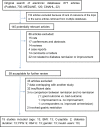Predictive factors of type 2 diabetes mellitus remission following bariatric surgery: a meta-analysis
- PMID: 25103403
- PMCID: PMC4297287
- DOI: 10.1007/s11695-014-1391-y
Predictive factors of type 2 diabetes mellitus remission following bariatric surgery: a meta-analysis
Abstract
Background: Although a few studies have been reported on predictive factors of postoperative diabetes remission, the conclusions remain inconsistent. This meta-analysis aimed to assess the preoperative clinical factors for type 2 diabetes mellitus (T2DM) remission after bariatric surgery.
Methods: The Cochrane Library, PubMed, MEDLINE, Embase, and CINAHL databases were searched. All human studies published in English between 1 January 1992 and 1 September 2013 reporting on the parameters of interest were included.
Results: In total, 15 studies involving 1,753 bariatric surgery patients were selected. Analyses were performed separately for the parameters of interest. T2DM remission was observed to be negatively correlated with age, diabetes duration, insulin use, and HbA1c levels. Baseline body mass index (BMI) and C-peptide levels were positively associated with the remission rate in Asian patients. However, there was no significant association between gender and remission rate.
Conclusions: Patients with younger age, short diabetes duration, better glucose control, and better β cell function were more likely to achieve T2DM remission after bariatric surgery. However, further randomized controlled trials with uniform remission criteria should be conducted to provide more reliable evidence.
Conflict of interest statement
The authors declare that no competing interests exist.
Figures
Comment in
-
Letter to "Predictive Factors of Type 2 Diabetes Mellitus Remission Following Bariatric Surgery: a Meta-analysis".Obes Surg. 2015 Dec;25(12):2424-5. doi: 10.1007/s11695-015-1886-1. Obes Surg. 2015. PMID: 26420762 No abstract available.
References
-
- Buchwald H, Estok R, Fahrbach K, et al. Weight and type 2 diabetes after bariatric surgery: systematic review and meta-analysis. Am J Med. 2009;122(248–256):e245. - PubMed
Publication types
MeSH terms
Substances
LinkOut - more resources
Full Text Sources
Other Literature Sources
Medical



